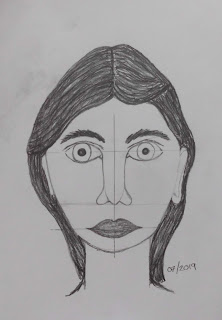Continuing our exploration of portraiture, this week we looked at the portraits of Leonardo da Vinci 1452 - 1519.
da Vinci, an Italian polymath of the Renaissance
whose areas of interest included
invention, drawing, painting, sculpting, architecture, science, music,
mathematics, engineering, literature, anatomy, geology, astronomy, botany,
writing, history and cartography.
Da Vinci’s most famous artwork is “The Mona Lisa” 1503 -
6 (77 x 53 cm: 30” x 21”) oil on panel,
The Louvre, Paris.
Da Vinci’s painting, “The Last Supper”, 1495 -
96 (180” x 350”) tempera over gesso, painted in the Convent of Santa Maria
delle Grazie in Milan is believed to be the most reproduced religious painting
of all time.
Leonardo da Vinci’s illustrated notebooks
& bound pages are legendary and are still being studied today.
Portraiture is a hugely wide subject. Traditional portraits capture a resemblance
or likeness to the subject. An approach
to understand how to capture a resemblance can be found in the notebooks of
Leonardo da Vinci.
The group used a simplified version of these to draw a generic, full frontal face.
Emphasis was placed on positioning the eyes, ears & mouth then the nose.
The second task was to take this knowledge and have a go at drawing faces cut from newspapers.
The lovely results are below.
Well done everyone!
 |
| demo page |


















No comments:
Post a Comment